Arthur's 'Alf Dozen 2015 edition
Or maybe 2014, as that's the year under the microscope. The shortlist has been out a while, the ceremony is Wednesday 6th May, so there's just time for me to vent my minuscule opinions on the subject before the rather better informed panel of judges proves me wrong. So… in name order:
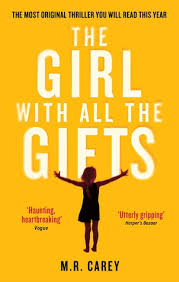 The Girl with all the Gifts by Mike Carey (Orbit)
The Girl with all the Gifts by Mike Carey (Orbit)
Synopsis: in the future, zombies. The setting kicks off as an intentionally straight zombie apocalypse, and a team of scientists and military trying to discover why some child victims of the fungal vector retain their intellect, whilst also inheriting the zombies’ uncontrollable hunger. Things go downhill…
My take: I kind of avoided this book for a long time. I really don’t like zombies because they've become such a tired and hackneyed concept. For that reason I am enormously indebted to the Clarkes judges because this is a fantastic book. It’s billed as a thriller, and I read it every spare moment I had because the suspense and pace make it enormously addictive, but it’s also fascinating SF, a new take on an old apocalypse, and we see most of the action from the point of view of one of the child-zombies, a character who is at once deeply sympathetic and terribly, terribly creepy. Of the six, this was the most compelling reading experience (insert own "when it gets its teeth into you" joke here). It just doesn't let up, and there's no spare fat at all in it.
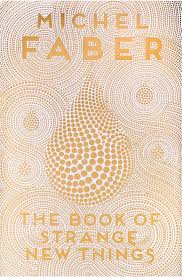 The Book of Strange New Things by Michel Faber (Canongate)
The Book of Strange New Things by Michel Faber (Canongate)
Synopsis: As this world slides into gradual chaos and disintegration, Peter leaves his wife Bea for the distant planet of Oasis, to serve as missionary to the humanoid natives. On arrival he discovers that far from facing the hostile reception he was anticipating, the locals are bizarrely desperate for the word of God.
My take: Missionaries in space is a subject SF has touched on before, but Faber’s slant on it is very different, and impossible to go into much without spoiling the dénouement. This is a book that lives entirely in Peter’s head. He is a devout, earnest, genuinely well intentioned man, and he strives in a very human way to deal with his separation from his wife (from whose increasingly anxious communications we learn about how things are going to pot back home) and with the unexpected and unnerving welcome he receives from the natives. The emphasis is very much on his journey, on faith and in human nature, but the planet of Oasis is intriguing physically as well as metaphorically. There are a lot of contrasts and games going on between order and chaos, passion and calm, both inner and outer, and the endgame is thought-provoking. This book looks at the outset as though the SF is going to be perfunctory and not thought through, made subordinate to the philosophy (why are the humans giving medicine to the natives when they have no idea about the alien biology?) but in fact there are answers to be found, and they're interesting and satisfactory ones. The book works well on all levels.
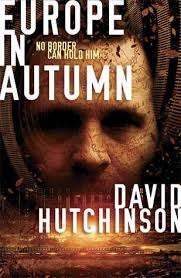 Europe in Autumn by Dave Hutchinson (Solaris)
Europe in Autumn by Dave Hutchinson (Solaris)
Synopsis: In the near future, Europe is fragmenting into ever smaller statelets and polities as regional separatism runs mad. In a world of borders and red tape, those who can travel freely can name their own price. Rudi goes from being a chef in Poland to becoming one of a shadowy organisation of couriers who travel the compartmentalised landscape of Europe with impunity. But with great freedom comes great enemies…
My take: I’ve written about this one here. This is the only entry I’d read before the shortlist was announced, and I loved it. There isn’t much (English language anyway) SF set in mainland Europe, and the bureaucratic balkanisation of Hutchinson’s future is endlessly plausible. The book is full of little living details of life in future Europe, and there’s also a Mystery to be unravelled as the plot deepens. Europe has been on more than one shortlist this year, and deservedly so. It’s a perfect balance of action and ideas. I’ve already praised it in past blog posts, but I can’t stress enough just how much I enjoyed this book. Hutchinson captures the idealism and the pettiness of nations and of people perfectly, and of all the protagonists on this list, I think I liked travelling with Rudi the most. (1)
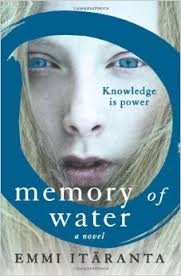 Memory of Water by Emmi Itäranta (Harper Voyager)
Memory of Water by Emmi Itäranta (Harper Voyager)
Synopsis: in a climate-racked future where the seas have risen but fresh water is vanishingly scarce, Noria is a tea master in Chinese-occupied Scandinavia, a trade that requires both large quantities of water and a perfect understanding of it. Her family’s dark secret is the hidden spring that allows them to continue their traditions, but the military is hunting water criminals…
My take: This is a very slow, careful, meticulous and thoughtful book. The future presented is believable, grim (with one potential ray of hope) and all the more real because it is happening to everyday people. The tea ceremony and the characteristics of water pervade the text at every level. Not the easiest read of the six by any means, but definitely one that stayed with me for a long time. Itäranta fuses style, setting and subject matter perfectly — water and flow are everything, in presence and absence. A very elegant, beautiful book, and perhaps the most wholly persuasive of the various fallen futures on display: not with a bang, but a parched whisper.
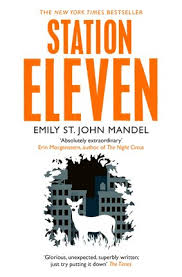 Station Eleven by Emily St John Mandel (Picador)
Station Eleven by Emily St John Mandel (Picador)
Synopsis: Arthur Leander, screen idol turned stage idol, dies in harness playing Lear. Even as he does, a catastrophic plague is just starting its journey through the world, wiping out most of the human population. Decades later, a band of players and musicians travels from town to town through a slowly rebuilding landscape.
My take: Station Eleven is a series of character studies more than a story in and of itself – the main two are Arthur, dead before the end of the world, and Kirsten who was a child actress in Lear, and carried the memory of the production into her later career as post-apocalypse Shakepearean. A variety of other viewpoint characters – pre- and post-plague – are presented, all of whom were touched somehow by Arthur’s work and life, and many of whom were touched by the obscure comic book Station Eleven, a story of a more fantastical dystopic future. Mandel writes beautifully, and her characters spring to life in their vignettes. Station Eleven has had a colossal critical success, and I can absolutely understand why, but… of all the shortlist, this was the one I didn’t quite get on with. It’s not a book that’s telling a story – there is a plot, but it is minimalist, and the SFnal elements are very much in the background. I enjoyed reading the various sections of the book but, as a purely personal reaction, I was waiting for it to lead me somewhere and it never quite did.
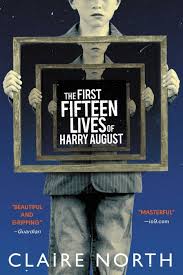 The First Fifteen Lives of Harry August by Claire North (Orbit)
The First Fifteen Lives of Harry August by Claire North (Orbit)
Synopsis: Crikey, where to start? Harry is a Kalchakra. Every time he dies he’s reincarnated. As himself, at the same time and place as his original birth. There is a whole society of Kalchakras spread across time living repeated, overlapping lives in a history that shifts and changes as they alter it. They try not to alter it, because if someone from 1900 sets in motion serious changes then those down the timestream will be faced with an unrecognisable world when they are reborn – if they are reborn at all. And now word is being passed back down through history through those overlapping lives that the end of the world is getting closer each time round.
My take: I don’t usually remember my dreams, but I dreamt about the world of this book while I was reading it, as my brain tried to process how it all worked. Mind. Blown. frankly. The whole setup with the Kalchakra is a stroke of genius on the part of North, and while we never find out why it happens, the book explores the implications of this peculiar arrangement very cleverly as Harry tries, life after life, to find out which of his peers is destroying the world. It’s kind of an espionage novel, but the lens of the Kalchakra means everything works differently to the norm – think of Blofeldt telling James Bond his plan, and then killing Bond – only when Bond is reborn back in the early 20th century he comes into being with that knowledge and can use it – paradox free – to stop Blofeldt. Or kill Blofeld before he gets into long trousers. Except what if Blofeld is also a Kalchakra… This is a must read book, win or lose, because the concept is so bizarre and so well executed.
So there we have Arthur’s ‘Alf Dozen 2015, and it’s an interesting split. August, Girl and Europe are books where the idea is expressed primarily through the onwards motion of the story, whereas to varying degrees Water, Station and Book are more retiring, drawn more by character than circumstance – which is not to say any of them are lacking in either dimension, but the split in emphasis did seem to fall straight down the middle between those sets. I don’t envy the judges, and although I personally didn’t quite click with the Mandel, they’re all worthy contenders. If I were on the board, I suspect I’d be arguing for Europe or August to take the crown, Europe because of the intriguing and very different setting, August because my brain has still not straightened out after reading it.
(1) Trying to get a cover image by way of careless searching on Google did result in my being bombarded with pictures of, well, Europe, in Autumn.
 © 2008-2025 Pan Macmillan
© 2008-2025 Pan Macmillan
[…] is Dave Hutchinson's Europe at Midnight. I have already waxed on the previous volume, the superb Europe in Autumn, in a previous post, and I liked it very much. Midnight is Hutchinson actually upping his game, […]